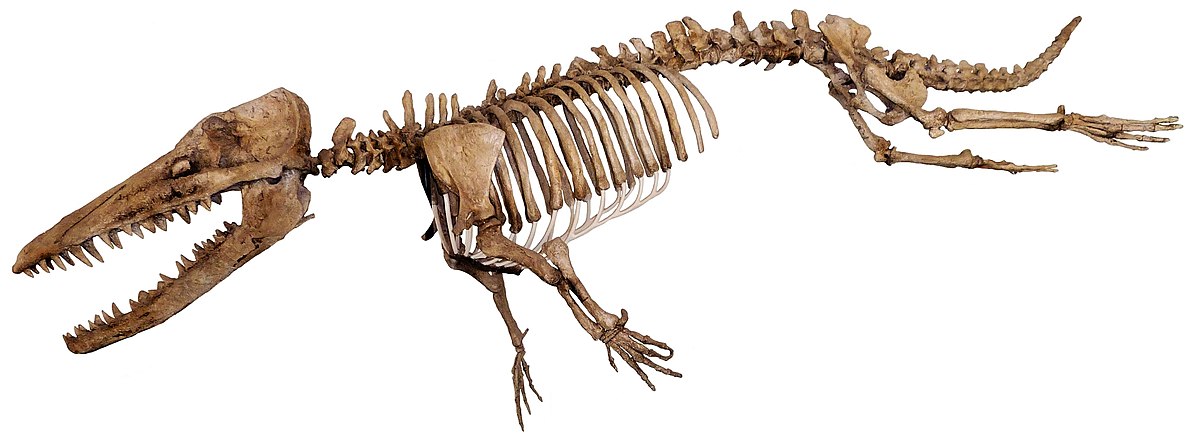Melodi
Disaster Cat
A bit more fun science news, I wouldn't want to meet this whale on land or sea!

 news.sky.com
Egypt: Researchers identify prehistoric killer whale that walked on land from 43-million-year-old fossil
news.sky.com
Egypt: Researchers identify prehistoric killer whale that walked on land from 43-million-year-old fossil
"It could kill any creature it crossed paths with," say Egyptian scientists who have discovered a new killer whale fossil from the African nation's Whale Valley.
By Lucy Mansfield, news reporter
Tuesday 14 September 2021 18:27, UK

Image:The fossils of a 43-million-year-old four-legged prehistoric whale have been found. in Egypt. Pic: AP
The ancient fossil, which was unearthed in Egypt's Western Desert in 2008, has been named as Phiomicetus Anubis, after the god of death in ancient Egypt.
The four-legged whale which is from the family of Protecetids, are extinct semi-aquatic whales that lived from 34 to 59 million years ago.

Image:Researchers said it was approximately 2.7m (9ft) long and weighed around 600kg
Professor Hesham Sallam, of Mansoura University in Egypt, the leading palaeontologist who examined the fossil, said the creature was unique in its versatility in the way its features were adapted to hunt on land and in the sea - characteristics that made it stand out among other whale fossils.
"We chose the name Anubis because it had a strong and deadly bite," said Professor Sallam.
"It could kill any creature it crossed paths with."
The creature's killer features included an elongated skull and snout. Its sharp hearing and acute sense of smell meant it was an efficient carnivore capable of hunting down, before grasping and chewing prey, researchers said. It was approximately 2.7m (9ft) long and weighed around 600kg.

Image:Professor Sallam said it 'could kill any creature it crossed paths with'. Pic: AP
Professor Sallam said his team did not start examining the fossil until 2017 because he wanted to assemble the best and the most talented Egyptian palaeontologists for the study.
The fossil sheds light on the evolution of whales from herbivore land mammals into a carnivorous species that today live exclusively in water.
The oldest fossil whales are approximately 50 million years old and are believed to have originated in modern-day Pakistan and India.
Scientists have not been able to reach a conclusive answer as to when whales moved from land to sea.
The location of the discovery of the fossil will give a clue as to how and when this happened.

Egypt: Researchers identify prehistoric killer whale that walked on land from 43-million-year-old fossil
"It could kill any creature it crossed paths with," say Egyptian scientists who have discovered a new killer whale fossil from the African nation's Whale Valley.
"It could kill any creature it crossed paths with," say Egyptian scientists who have discovered a new killer whale fossil from the African nation's Whale Valley.
By Lucy Mansfield, news reporter
Tuesday 14 September 2021 18:27, UK

Image:The fossils of a 43-million-year-old four-legged prehistoric whale have been found. in Egypt. Pic: AP
The ancient fossil, which was unearthed in Egypt's Western Desert in 2008, has been named as Phiomicetus Anubis, after the god of death in ancient Egypt.
The four-legged whale which is from the family of Protecetids, are extinct semi-aquatic whales that lived from 34 to 59 million years ago.

Image:Researchers said it was approximately 2.7m (9ft) long and weighed around 600kg
Professor Hesham Sallam, of Mansoura University in Egypt, the leading palaeontologist who examined the fossil, said the creature was unique in its versatility in the way its features were adapted to hunt on land and in the sea - characteristics that made it stand out among other whale fossils.
"We chose the name Anubis because it had a strong and deadly bite," said Professor Sallam.
"It could kill any creature it crossed paths with."
The creature's killer features included an elongated skull and snout. Its sharp hearing and acute sense of smell meant it was an efficient carnivore capable of hunting down, before grasping and chewing prey, researchers said. It was approximately 2.7m (9ft) long and weighed around 600kg.

Image:Professor Sallam said it 'could kill any creature it crossed paths with'. Pic: AP
Professor Sallam said his team did not start examining the fossil until 2017 because he wanted to assemble the best and the most talented Egyptian palaeontologists for the study.
The fossil sheds light on the evolution of whales from herbivore land mammals into a carnivorous species that today live exclusively in water.
The oldest fossil whales are approximately 50 million years old and are believed to have originated in modern-day Pakistan and India.
Scientists have not been able to reach a conclusive answer as to when whales moved from land to sea.
The location of the discovery of the fossil will give a clue as to how and when this happened.






